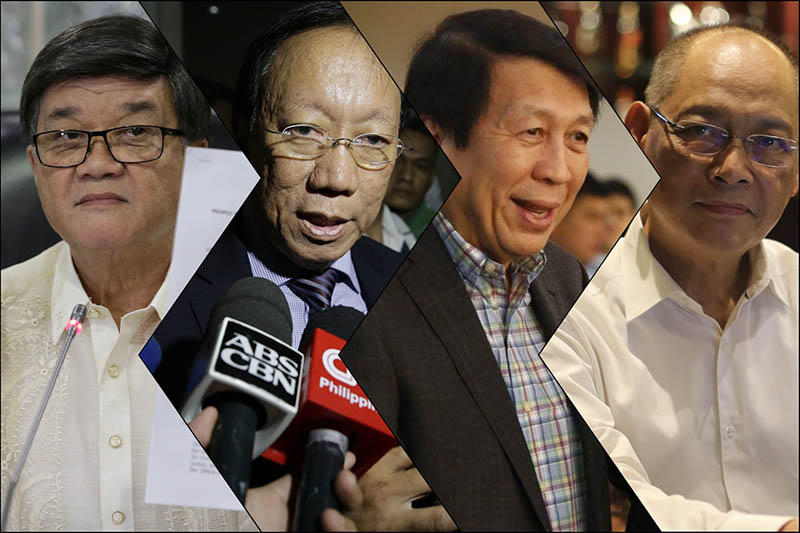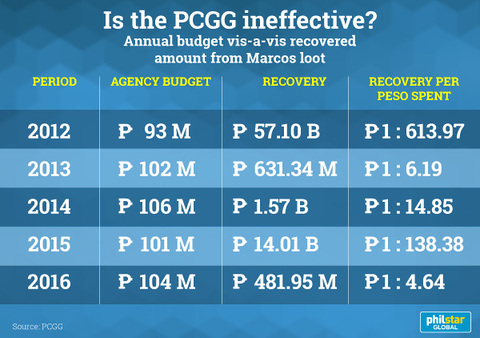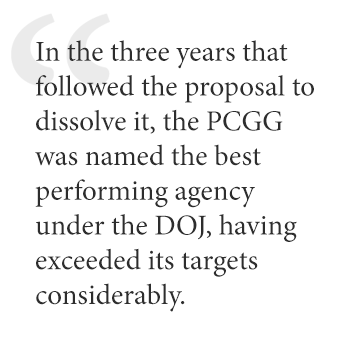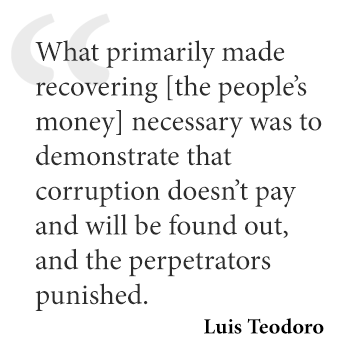A look into plans to abolish the agency going after Marcos loot

To abolish or not? Justice Secretary Vitaliano Aguirre is opposing the abolition of the PCGG. The office of Solicitor General Jose Calida will benefit from House majority leader Rodolfo Fariñas' proposal to dissolve the agency. It is also backed by Budget Secretary Benjamin Diokno.
MANILA, Philippines (First Published July 27, 5:10 p.m.) — The Philippine Commission on Good Government has outlived its mandate and is no longer necessary, so goes the argument of those calling for its abolition.
But the PCGG, established through the first executive order of President Corazon Aquino in 1986, has since recovered P170 billion in ill-gotten wealth amassed during the dictatorship of Ferdinand Marcos. This includes coco levy funds, Swiss accounts, and money from the sale of sequestered assets and settlement with cronies. On top of this, priceless jewelry, artwork and other assets have also been seized.
For an agency that has operated on a yearly budget of more or less P101 million, the yield has been greater than what was sowed.
'They don't do anything'
On Wednesday, Budget Secretary Benjamin Diokno dismissed the role of the PCGG, decades since the dictatorship was toppled and the subsequent return of the Marcoses to power — the late strongman's son, Ferdinand Jr. is a former senator and is pursuing his claim of being cheated of the vice presidency.
"They don't do anything. What do they do?" Diokno said.
READ: ‘Irrelevant’ tag surprises PCGG
Diokno's statement seems to depart from the rationale of pending legislation that President Rodrigo Duterte singled out in his State of the Nation Address last Monday.
House Bill 5707, the proposed Rightsizing the National Government Act, would grant the president the power to abolish offices under the executive branch deemed redundant, with overlapping functions or no longer necessary.
In the context of the bill, PCGG's role may be deemed redundant, but whether it is useless is a point for contention.
With an estimated $10 billion in ill-gotten wealth to collect, the PCGG has a long way to go. The amount may have even swelled through the years from accumulated interest.
On Thursday, the PCGG rejected Diokno's remark. "Why is there a question on its budget and relevance when PCGG's cost to recovery ratio is exemplary as shown by these numbers? Of all agencies?" the agency said.

Abolition calls not new
The purpose of the PCGG was questioned when Camilo Sabio, who was at the helm of the agency from 2005 to 2010, was accused of graft over anomalous car lease deals. The Sandiganbayan found him guilty last month.
 Recent calls to dissolve the PCGG, however, are a repeat of a proposal in 2011 by the very chair of the agency. Andres Bautista, who now heads Comelec, proposed that the PCGG wind down efforts by 2013 to regroup and cede its functions to the Department of Justice.
Recent calls to dissolve the PCGG, however, are a repeat of a proposal in 2011 by the very chair of the agency. Andres Bautista, who now heads Comelec, proposed that the PCGG wind down efforts by 2013 to regroup and cede its functions to the Department of Justice.
He said the PCGG had found it challenging to recover the remaining half of the $10 billion allegedly acquired by the Marcos family because of their newfound political clout. Moreover, cases filed to recover part of the amount were met with adverse rulings over technicalities.
Bautista also said that because of its meager budget, the PCGG could not go after alleged Marcos assets abroad, particularly in Australia, Germany, Liechtenstein and Switzerland. He recommended that the commission's functions be taken over by the DOJ and the Department of Finance.
Despite his reservations, the PCGG remained. In the three years that followed the proposal, it was named the best performing agency under the DOJ, having exceeded its targets considerably.
So what now?
Besides the rightsizing bill that threatens the existence of the PCGG, two draft laws—House Bills 5216 and 5233—filed at the House of Representatives seek its abolition, latching on to Solicitor General Jose Calida's recommendation to fold it into his office.
Calida argued that consolidating PCGG functions under the Office of the Solicitor General "will eliminate redundant, duplicative and overlapping functions" since both agencies share a client—the Republic of the Philippines.
 ALSO READ: Solgen told, PCGG not irrelevant
ALSO READ: Solgen told, PCGG not irrelevant
Justice Secretary Vitaliano Aguirre, to whose department the OSG is nominally attached, is blocking the solicitor general's idea. Strongly objecting to the bills, Aguirre argued that the abolition is a "rider," or an additional provision added to a measure already being considered.
This is not allowed under the Constitution, he said in the position paper.
Wanting the status quo retained, Aguirre also indicated that the PCGG's function is different from that of the solicitor general's, which is to be the government's chief legal counsel.
The PCGG, meanwhile, is a quasi-judicial agency whose findings are treated binding, in a manner similar to findings of trial courts.
The agency, however, stands for a mission beyond its technical functions. Former University of the Philippines dean Luis Teodoro, a political prisoner under Marcos' martial law regime, suggested that cost effectiveness and similar practical purposes must not efface the PCGG's very mandate, even if it has to be taken on by a new body.
He noted in a 2013 commentary that the necessity of recovering the people's money is to demonstrate "that corruption doesn't pay and will be found out, and the perpetrators punished."
- Latest
- Trending





























